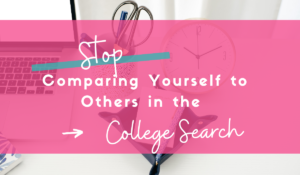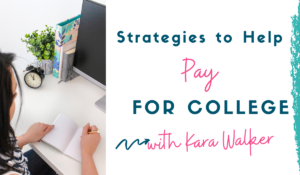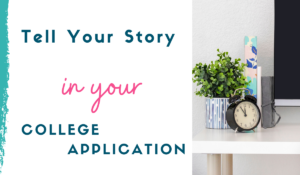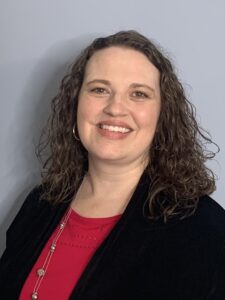When the path to college isn’t one size fits all, what does that mean for your student during the search? We talked about the various options from enlisting in a branch of the military to certification, two-year schools, and four-year schools. A large part of that college search is going to be finding the right fit for each individual person. We are continuing the conversation about the path to college for each person.
This show is for the confused college applicant and family to learn simple and effective strategies to help you find the BEST college for your student while having positive conversations. This will turn you into the College Ready applicant and family so you can be confident with your next steps and your choice of college!
Please subscribe so you don’t miss any episodes! Here are a few episodes you might be interested in:
- Episode 4 You Don’t Have to Attend an Elite College to Be Successful
- Episode 9 Now is the BEST Time to Start Your College Search
- Episode 26 How to Find a Career that is Right for Me
- Episode 27 Your Path to College is Not One Size Fits All
You can also download our free guide on How to Start or Expand Your College Search here.
I’m Courtney Kountz and I’m looking forward to serving you and your student!
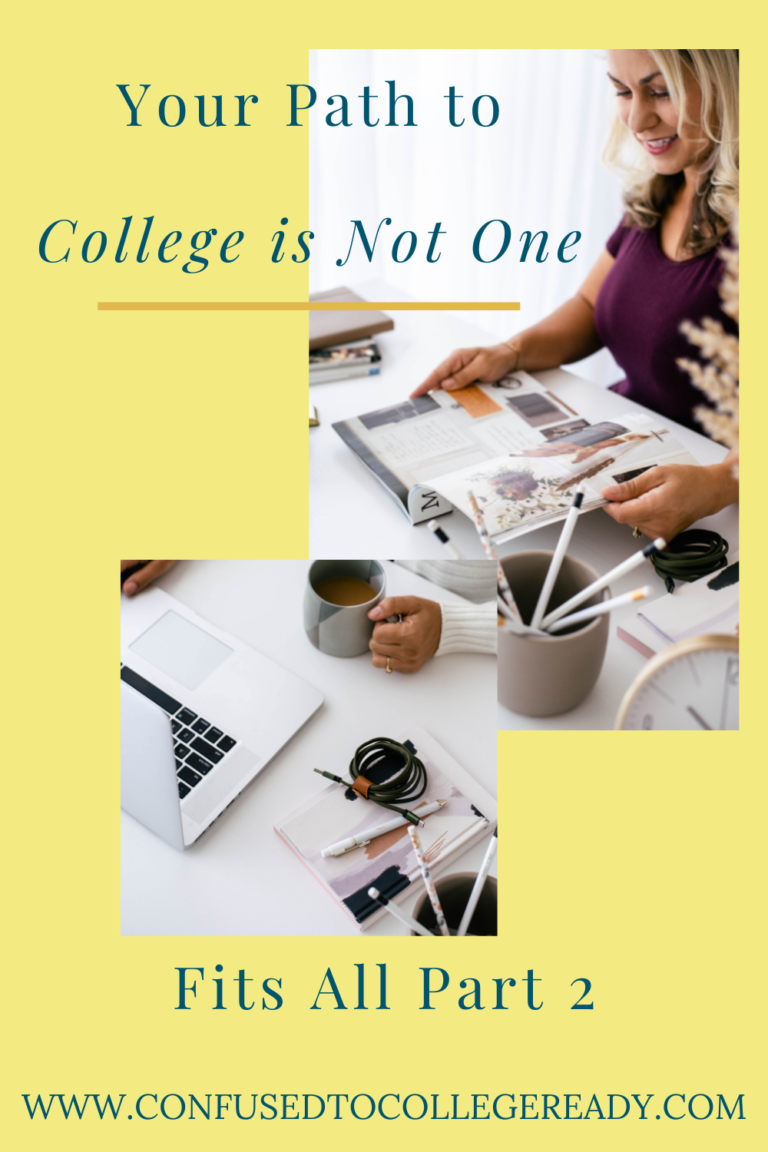
0:00:00.1 S1: When the path to college isn’t one-size-fits-all, what does that mean for you and your student during that search, so today is going to be part two of that, your path to college for you and your student does not have to be a one-size-fits-all process, we want to be able to make sure that we have talked about all of the options and that we know that your student can take an individual and very unique search approach as they are looking at what is going to be the right place. It doesn’t have to be that most elite or it doesn’t have to be a perfect school, we want to be able to find the school that’s going to be the right fit. So stay tuned.
0:00:46.8 S1: Hey there, I’m Courtney and I’m the founder of confused to college ready. With over 15 years experience as a mental health therapist turned school counselor, I am bringing my experience and expertise to help you navigate the college search experience. My goal is to serve students and their families and unlock the secrets to college searching stay to…
0:01:13.1 S1: Every student that I work with has their own unique story and journey that is going to be ahead of them, and every family that I work with is completely different, sometimes I end up having siblings that I work with as parents, I’m sure that you know, if you have multiple children, or if you have nieces and nephews, you will see that every single person, just like all of us are, as parents are unique and we have our own path that we’re going to take, and I am very, very passionate about making sure that our students understand that their unique path is… Absolutely, okay, no matter where they end up. In our last episode, we talked about this and talked about that nothing is going to be a one-size-fits-all, and I want to go into some more detail into different scenarios… Different options that are available for our students, and to be able to just give you a better idea of what to expect. So I’m going to cover a couple more terms and then I’m going to give you some examples of some different things, so one of them is going to be direct admission, we talked about students being accepted to that four-year school, the two-year school, looking at certification, looking at…
0:02:30.6 S1: And some people are not going to go to school at all. Right away, they might take a gap year, they might enlist in the military, they might go into the workforce and then return, or some people are going to just stay straight on that path, but when we have direct admission, that’s where a student is told that, yes, you have been accepted into this college, here is your cost of tuition, here is a Roman board for students that are going to be living on campus. Here is the information about any kind of loans, scholarships, other financial aid information, and you’re admitted directly into that particular school. Another thing that happens is that sometimes students are wait-listed where they… If a spot opens up, they would be given that spot, or sometimes it’s a deferment that it’s not a no, but you’re going to be getting the answer to your admissions decision later on because they need to see how many people the school is going to be accepting and how many people are going to accept and say yes that they wish to go to that school. Another thing that happens, and we talked about this last time, is bridging, and that could be a program where the school has students bridge or it’s one where the student decides that they are going to transfer on their own, and so they’re looking at attending a two-year school or sometimes it’s just for one year and then they’re going to transition over to being a full-time student at that particular college, so those are a lot of the different terms, a lot of the lingo around different admissions decisions.
0:04:07.8 S1: And what I want to do is give you a couple of examples of students that I have worked with in the past, and so it can be really confusing at first when… You don’t know where you want to go. You don’t know what you want to do. And if a student doesn’t get that direct admission, it can… I have seen a lot of disappointment in tears and frustration of Why am I still having to wait or Why didn’t I get into this school? And that is where, again, I want you to understand that everybody has that unique journey that they’re supposed to take, and a good amount of the time it ends up… The students are a whole lot happier with that route, some students do to say that they want to end up looking at transferring. And we’ll talk more about that too. One of the students that I want to tell you about, they had some lower grades in freshmen year, sophomore year, we talked… During their graduation plan meetings, we talked about, Hey, this is why your grades matter, this is why what you do right now matters. It was in the middle of their junior year that they thought, Holy cow, okay, now it kind of clicked for that particular student, their family had tried having conversations…
0:05:18.3 S1: I had had conversations with the student because they had some big dreams ahead of them, we tried talking about what was important and why they needed to make sure that they were doing everything that they needed to in their classes, getting the work turned in on time and why late work made a difference. All of those different pieces. This particular student ended up that they did turn things around towards the end of junior year, they worked really hard in junior and senior year, a large part of their application, their personal statement, any of the short answer, the questions that they… Dressed talked a lot about the lessons that they had learned, and they knew that some of those dreams that they had had when they were younger because of what happened to them in the early part of high school, and because it took them a little bit longer to turn things around, since it wasn’t until the middle of junior year, they realized that going to that top tier school, that elite school, or even the top to your school that was in state wasn’t going to be an option. So we talked about what were the students options, were they going to go to a two-year school and transfer, were they going to try and bridge into a one of the top tier in state schools, were they going to look at going to a smaller in-state school in this particular case, they ended up going to a smaller in-state school, that didn’t mean that…
0:06:52.0 S1: We ended up that we also had to talk about financial aid and scholarships because the student’s grades were impacted, and so the student had to spend quite a bit of time in their senior year looking for scholarships and other things, but that was their particular pathway to college. And it was something that they ended up being really, really happy with, and that hard work paid off. Later on, the students said that they wish that they had worked harder and had realized it, but again, it was their unique pathway, and those were things that they had to learn on their own terms, rather than just getting into a situation and not taking the steps to be successful or to find other routes. Now, I also have had students who have ended up going to a two-year school, and that was the best path for them, they were able to focus… They were able to take some more time. I’ve had students I’ve worked with as well, that they went to that four-year school and ended up that for one reason or another, that they were not successful, and so they were on academic probation or they were completely withdrawn, so sometimes those are really hard lessons to learn, but in this particular case, like I said, this student ended up being able to attend that smaller in-state school and was very, very successful.
0:08:16.2 S1: So I also want to talk about different reasons for transferring, so this is something where… Transfers can happen at any time. They’ll sometimes quite frequently, one of those is a bridge program, so if a student is bridging, then in their freshman year, they are looking at attending to your school that that four-year college has an agreement with and they’re going to transfer. And Bridge, once they have proven that they can be successful and take those classes, they’re going to bridge in, also students will not be part of the Bridge program, but they’ll go directly into a two-year school, they might end up still living at home, which can be an incredibly economical and money-saving option, and so students will go for that first year or two, they will live at home, and then they’ll end up transferring in, sometimes getting even more scholarships. It can be a great option also. If students have a Change of Major, if you end up that you are wanting to go into, you’re in the, let’s say in the Midwest. And a student decides that they want to go into marine biology, that is going to be a really hard thing to do if you’re going to a school that’s in the midwest and is not anywhere near any kind of ocean, and so that might be a reason to change or if you are at a school that is primarily STEM-related science, technology, engineering, mathematics, and a student decides that they want to go into more of an Arts major, or where they would need a bachelor of ours or some type of other major that might require a change of schools, absolutely an okay thing as students are figuring out more about what they do or do not want, another reason for transfers might be that a student ends up that they are moving further away from family, and they get there and they say, You know what, I need to be close back, closer to my family, my friends, I miss everyone, I want to be closer.
0:10:18.9 S1: Or some type of event happens that causes them to need to go back, sometimes students… And I have seen this before as well, where a student ends up that they choose a school, and particularly during the pandemic, it was really hard to be able to visit places and be able to get a feeling of what things were like on that campus when we were not able to tour the way that we normally would in campuses weren’t running the way that they normally would, and so that can be a reason for a change as well. Feeling like it’s just not a good fit, and this is not what I wanted, or, this isn’t what I am interested in. Very similar to that change of major, sometimes students and that enters in your year, they get an offer from a college that says, You know what, we’re going to accept you, but we’re going to accept you conditionally and we’re going to accept you for your sophomore year, so what we need you to do is go attend another college for your freshman year, as long as your grades look great, then you are welcome to come join us in your sophomore year.
0:11:23.7 S1: Sometimes students decide, You know what? That’s absolutely what I’m going to do, and they follow that plan, they go to a school for their freshman year, and then it’s not really bridging, but it is that they’re able to come in and then be a full student of the second college in their sophomore year. Sometimes students go to that first school and to like, you know what, I don’t want to make a change. I’ve met some great friends, I really like this. I have decided, this is where I want to go, so those are all different options and reasons why students might end up transferring, and again, it goes back to, you have a unique journey or your student has a unique journey, and we want to be able to make sure that you understand what the path is to that journey, your path to college, and so that you can go from being that confused, I don’t know where I’m going, I don’t know what steps to take… What do we do next? I’m a confused applicant, I’m the parent of a confused applicant to being confident and ready to make sure that you are making decisions that are going to be in your best interest.
0:12:32.6 S1: I’m not saying that transferring is bad by any means, that sometimes that is exactly the right thing that needs to happen, but I want you to be confident in the steps that you’re taking, and in the next couple of weeks, you’re going to hear more about a course that I’m going to be launching that is going to give you that exact help, so that you know what those steps are, you know exactly what you need to do, how things need to go and where how things need to go as far as planning, as far as getting systems in place, and being able to have that individual support from me with different group calls and other things, so more is going to be coming on that later, that’s a little bit more of a spoiler that I had to plan to give you all… But I am super, super excited for this, it’s going to be a great opportunity, no matter what path your student takes or you as the student, take that unique fit, finding what’s right for you, that’s exactly what our goal is to help you navigate. Those next steps, and if you have not already, I would absolutely love for you to leave a review for our podcast, you can join our Facebook group, that’s going to be one of the best ways to hear more about what we’re doing, it is confused to college ready dot com group.
0:13:48.9 S1: And then the other thing that we have is the first couple of steps, and we’re really going to dive into this as we get closer to launching the group, we’re going to have some webinars that you can attend and hear exactly how to get started or expand your college search if you go to confuse to ready dot com, how to start. You’re going to learn a lot more about that. And until next time, I look forward to hearing from you about how things are going, and I’ll talk.
0:14:18.2 S1: To you soon, baby. Thank you so much for listening to our podcast, please subscribe so you don’t miss any future episodes, you can find us on Instagram and Facebook, a confused to ready and download our free guide on how to start or expand your college search. A confused to ready dot com. How to start?




